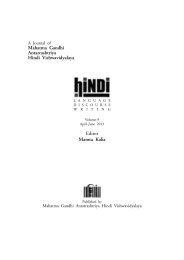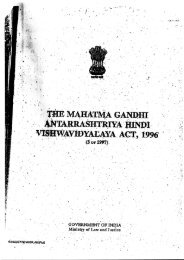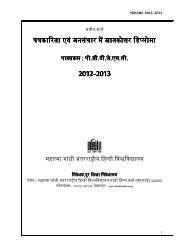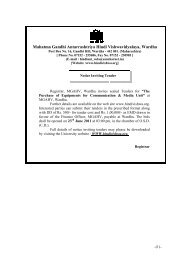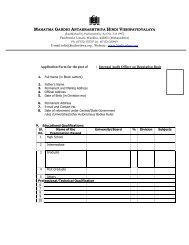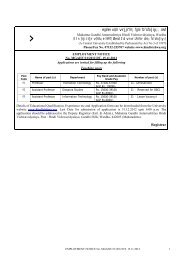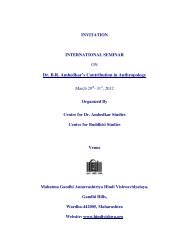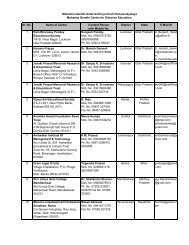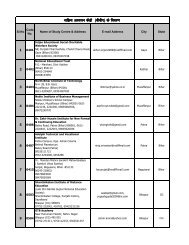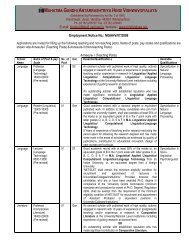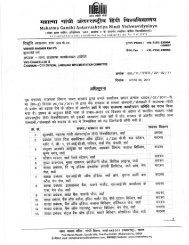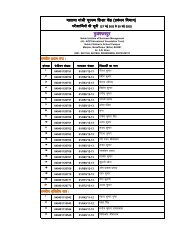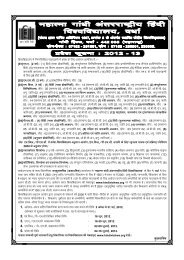Mamta Kalia
Mamta Kalia
Mamta Kalia
You also want an ePaper? Increase the reach of your titles
YUMPU automatically turns print PDFs into web optimized ePapers that Google loves.
‘joothan’ if someone else besides the<br />
original eater were to eat it. The word<br />
carries the connotations of ritual purity<br />
and pollution as ‘jootha’ means polluted.<br />
I feel that English equivalents such as<br />
‘leftovers’ or ‘leavings’ cannot substitute<br />
for joothan. While ‘leftovers’ has no<br />
negative connotations and can simply<br />
mean food remaining in the pot that<br />
can be eaten at the next meal, ‘leavings’,<br />
although widely used by Ambedkar and<br />
Gandhi, is no longer in the active<br />
vocabulary of Indian English. ‘Scraps’<br />
or ‘slops’ are somewhat approximate to<br />
joothan, but they are associated more<br />
with pigs than with humans.<br />
The title encapsulates the pain,<br />
humiliation and poverty of Valmiki’s<br />
community, which not only had to rely<br />
on joothan but also relished it. Valmiki<br />
gives a detailed description of collecting,<br />
preserving and eating joothan. His<br />
memories of being assigned to guard<br />
the drying joothan from crows and<br />
chickens, and of his relishing the dried<br />
and reprocessed joothan burn him with<br />
renewed pain and humiliation in the<br />
present.<br />
The term actually carries a lot of<br />
historic baggage. Both Ambedkar and<br />
Gandhi advised untouchables to stop<br />
accepting joothan. Ambedkar, an<br />
indefatigable documenter of atrocities<br />
against Dalits, shows how the high caste<br />
villagers could not tolerate the fact that<br />
Dalits did not want to accept their joothan<br />
anymore and threatened them with<br />
violence if they refused it. Valmiki has<br />
26 :: April-June 2010<br />
thus recuperated a word from the painful<br />
past of Dalit history which resonates<br />
with multiple ironies. Gandhi’s<br />
paternalistic preaching, which assumed<br />
that accepting joothan was simply a bad<br />
habit the untouchables could discard,<br />
when juxtaposed against Ambedkar’s<br />
passionate exhortation to fellow<br />
untouchables to not accept joothan even<br />
when its refusal provoked violence, press<br />
against Valmiki’s text, proliferating in<br />
multiple meanings.<br />
It is not surprising, therefore, that<br />
one of the most powerful moments of<br />
the text is Valmiki’s mother’s overturning<br />
of the basketful of joothan after she is<br />
humiliated by Sukhdev Singh Tyagi. Her<br />
act of defiance sows the seeds of rebellion<br />
in the child Valmiki. The text is dedicated<br />
to her and Valmiki’s father, both<br />
portrayed as heroic figures, who desired<br />
something better for their child and<br />
fought for his safety and growth with<br />
tremendous courage. Valmiki’s father’s<br />
ambitions for his son are evident in the<br />
nickname, Munshiji, that he gives Valmiki.<br />
The child Valmiki rises on their shoulders<br />
to become the first high school graduate<br />
from his basti. He pays his debt by giving<br />
voice to the indignities suffered by them<br />
and other Dalits.<br />
Valmiki’s inscription of these moments<br />
of profound violation of his and his<br />
people’s human rights is extremely<br />
powerful and deeply disturbing. ]oothan<br />
is constructed in the form of wave upon<br />
wave of memories that erupt in Valmiki’s<br />
mind when triggered through a stimulus



